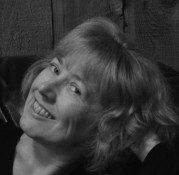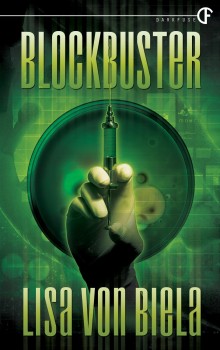Blockbuster by Lisa von Biela
Warning: If you have a sore throat, a small skin rash, or a persistent headache, you might want to put off reading BLOCKBUSTER until you’re fully recovered. Lisa von Biela has written a frightening tale of rogue pathogens that can think, and BigPharma at its most chillingly corrupt. This techno thriller, published in January by DarkFuse, ratchets up the terror factor to its limits. This is a story you’ll race through, but the horror of a rampaging and flesh eating MRSA II bacteria will stay with you long after you’ve finished the last page.
Lisa von Biela worked in Information Technology for twenty-five years before graduating from the University of Minnesota law school. She now practices law in Seattle, Washington and serves on the editorial board of The SciTech Lawyer, a quarterly publication of the American Bar Association. von Biela is also the author The Genesis Code, The Janus Legacy, Ash and Bone, and Skinshift (June 2015).
Readers have called her stories “unputdownable” and thought provoking, and she recently received honorable mention in the Examiner’s list of 10 Best Books of 2014.
She took time from her busy work and writing schedule to talk to The Big Thrill.
BLOCKBUSTER explores both the ethics of the pharmaceutical industry and the terror of drug resistant pathogens. Do you believe drug companies’ seeming unlimited opportunity for profit compromises their integrity?
I believe in any industry, money can—and often does—corrupt. I don’t know if any drug company has pursued the business model in BLOCKBUSTER. But it could happen, couldn’t it? Maybe it has, at least to some extent, and that’s what scares me. Drug development is incredibly costly and time-consuming; profits from a blockbuster drug can be astronomical. Some degree of ethical lapse for the sake of the bottom line wouldn’t surprise me. I just hope it never rises to the level it does in BLOCKBUSTER!
Aside from the sheer entertainment of this taut thriller, is there a message you hope your reader will grasp?
Oh, definitely. It’s a theme that runs through all my thrillers, actually: no matter how fabulous, every technological advance has a dark side to watch out for. In my debut novel, The Genesis Code, the technology is a brain chip capable of bidirectional transmission. It starts out being used for mainly beneficial purposes, but by the end of the book, it’s exploited in a very dangerous way. In The Janus Legacy, the beneficial advance is designer transplant organs, but then the characters go on to experiment with cloning human beings for organ harvesting purposes. An ethical quagmire ensues.
BLOCKBUSTER is set about ten years in the future, when drug development technology has advanced to the point that a single multi-purpose machine does most of the work, speeding up the process considerably and eliminating the need for animal and human testing. Great advance, huh? So great it tempts BigPharma into a whole new business model that throws ethics right out the window and sets up a biological catastrophe.
You’ve written articles for Food and Drug Law Journals and are a practicing attorney. Does your practice deal with medical and pharmaceutical law?
The answer to this is both “no” and “sort of.” I’m in legal services, practicing mainly foreclosure prevention and defense. No scitech there whatsoever. But my undergrad at UCLA was pre-vet, so I do have a scientific background. While in law school, I gravitated toward subjects that combined consumerism and med/tech (like FDA Law and Health Law), and that’s when I first became involved with the SciTech section of the American Bar Association. I’ve served on the editorial board of The SciTech Lawyer since 2009. So, while I don’t practice medical and pharmaceutical law, I do have a hand in the subject via my editorial work.
What were the challenges (research, literary, psychological, and logistical) in bringing the book to life?
I realized early on when planning BLOCKBUSTER that real life was going to present a problem. The drug development and approval process is lengthy, and I had to do something about that, else the book would be anything but thrilling. I decided the solution was to set the story in the future and “create” the lab equipment I needed to make the drug development process much, much faster. To set a consistent stage, I then had to “invent” futuristic versions of everyday technology, like cell phones, computers, kitchen appliances, and so forth. So I spent quite a lot of time mentally designing all these things at a fairly detailed level before I began drafting—and then making sure I portrayed them absolutely consistently throughout the book.
BLOCKBUSTER involves two corporations and associated characters and settings, as well as the President, and so comprises a much larger scale overall than my prior works. That was a challenge as well, to keep everything consistent and distinct throughout.
What do you consider the key to a great techno thriller?
I love a techno thriller that keeps me turning the pages, but also makes me wonder, “Could this really happen? What if it did?” I think if the plot involves something menacing that could happen, it makes it all the more frightening to read.
Who would you consider the best authors in this genre?
I tend to prefer my thrillers in the bio/techno/medical subcategory. Of course, there’s Robin Cook and Michael Crichton. In the broader scientific arena, Amy Rogers. When I’m in the mood for undercover op/spy-type thrills, Allan Leverone’s Tracy Tanner books are hard to beat.
What books are currently on your nightstand?
A wild assortment. Reversion, The Sweet Hereafter, The Murder in Skoghall, The Word Exchange: A Novel, some short story collections (Theodore Sturgeon, Philip K. Dick, Eudora Welty), the Deadly Dozen (12 Mysteries/Thrillers—I’ve read several of them, more to go!).
Is there a certain kind of book you steer clear of as a reader? As a writer?
Romance, and romance. I tried to read a romance novel once, and I just couldn’t do it. I doubt I could write one, either! I guess my point of view is a tad too dark.
What was the last truly great book you read?
Probably Flowers For Algernon. Just amazing.
If you could require the president to read one book, what would it be and why?
Nickel and Dimed. This book really opened my eyes to how people can remain trapped in poverty in a kind of vicious cycle. It’s about more than not having enough income to make ends meet; it’s about the spiral of repercussions of having insufficient income and the roadblocks to getting help and breaking that cycle. Reading this book started me thinking about going to law school, hoping to make a difference in some way. All presidents should read it to understand what life is like for those in poverty, and how to better design laws and programs to provide truly effective help.
Which famous person, living or dead would you like to meet and why?
Rod Serling, no doubt about it. I’m a huge fan of the original Twilight Zone, and would love to know how he managed to crank out such great work on such a relentless schedule. Maybe he sold his soul to the devil or something. It would be good to know, right?
If you could have been the original author of any book, what would it have been?
That’s hard. To Kill A Mockingbird is one of my all-time favorite books. Fahrenheit 451 is simply genius. Snow Falling on Cedars somehow manages to be all sorts of things (mystery, legal thriller, historical, literary, and on and on) in one beautifully written book. I’d love to achieve that in a single work.
Do you ever experience writer’s block, and, if so, how do you push through it?
Sure, there are times I look at a blank page and my eyes temporarily glaze, or I get to a point in plotting a work where I feel like I’ve painted myself into a corner. This is going to sound weird and beyond old-school, but it works for me. I get out my spiral notebook (gasp, paper!) and glitter gel pens and I start—in longhand—just sort of talking to myself in writing. I think it triggers some other part of my brain, and often that can get me through or around a stoppage. I also tend to get breakthrough ideas about 3am that jar me awake. And sometimes, you do just need a little distance from the work to recharge and come back at it.
My other secret weapon is a cup of tea made from one bag each of chamomile and peppermint. I don’t know why, but it works. In fact, I was struggling with one of the questions in this interview—got my tea, and bang, the answer came to me!
What advice would you give aspiring writers?
You’ve got to do the work. No two ways about it. Don’t wish it. Don’t dream about it. Do it! I started with short stories, and still believe that’s the best way to begin to hone your craft on something manageable. In my opinion, starting with novel-length work when you’re still trying to come to grips with the basics is a recipe for disaster. Too many words to wrangle!
What is the most important lesson life has taught you?
Nothing worthwhile comes quickly. Sometimes you just have to have faith that honest, hard work will pay off in the end.
Can you tell us a little about your next project?
Last year, I signed a three-year/three-book deal with my publisher, DarkFuse. I turned in the first novel under that contract a few weeks ago. The working title is Broken Chain, and it takes a look at what might happen if we slip up in our engineering of the food chain. What if something started causing dangerous physical and behavioral changes in people? It begins as a detective story to find out what’s causing a massive wave of violence—then it becomes a post-apocalyptic tale. What’s it like to live in a new world where certain major food staples are no longer safe to eat, and are, in fact, banned?
So that one’s been turned in, and I’m starting the high-level planning on the next novel. It’s looking like it will be a combination legal/medical thriller. Stay tuned!
Thanks so much for having me back at The Big Thrill!
*****
 Lisa von Biela worked in Information Technology for 25 years, then dropped out to attend the University of Minnesota Law School, graduating magna cum laude in 2009. She now practices law in Seattle, Washington. Lisa began writing short, dark fiction just after the turn of the century. Her first publication appeared in The Edge in 2002. She went on to publish a number of short works in various small press venues, including Gothic.net, Twilight Times, Dark Animus, AfterburnSF, and more. She is the author of the novels The Genesis Code and The Janus Legacy, as well as the novella Ash and Bone.
Lisa von Biela worked in Information Technology for 25 years, then dropped out to attend the University of Minnesota Law School, graduating magna cum laude in 2009. She now practices law in Seattle, Washington. Lisa began writing short, dark fiction just after the turn of the century. Her first publication appeared in The Edge in 2002. She went on to publish a number of short works in various small press venues, including Gothic.net, Twilight Times, Dark Animus, AfterburnSF, and more. She is the author of the novels The Genesis Code and The Janus Legacy, as well as the novella Ash and Bone.
To learn more about Lisa, please visit her website.
- Hostage Taker by Stefanie Pintoff - August 31, 2015
- The Altar Girl by Orest Stelmach - April 30, 2015
- Stiff Penalty by Annelise Ryan - February 28, 2015

